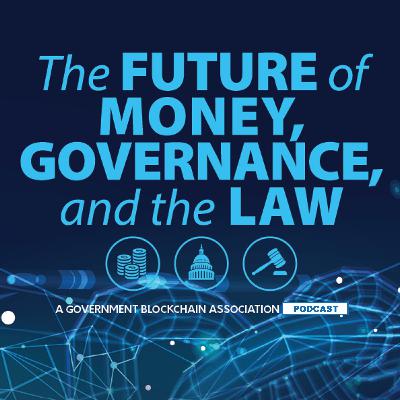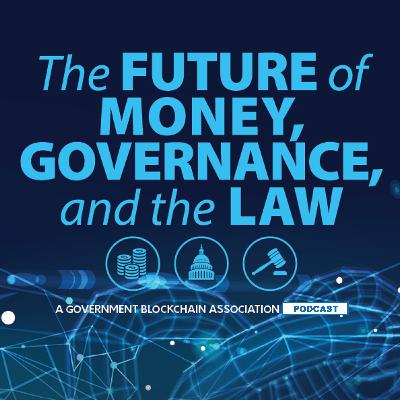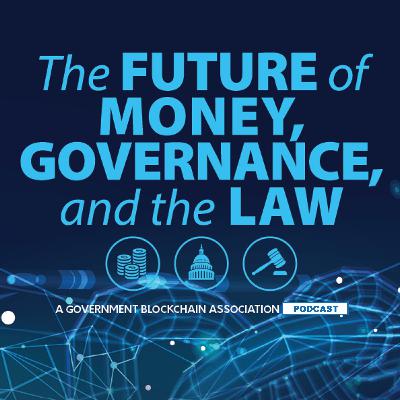Discover The Future of Money, Governance and the Law
The Future of Money, Governance and the Law

35 Episodes
Reverse
Non-fungible Tokens, or NFTs, are a form of digital assets that can represent anything from pictures to audio files, to videos – really any kind of art that you want to buy, sell, or trade over the internet.
Their ownership is tracked by immutable distributed ledgers, such as blockchain – the same kinds of ledger technology that is used to record ownership of other digital assets, such as bitcoin or other crypto currencies.
But are the existing methods of managing the exchange of digital assets really optimizing the markets they serve? In some communities, there is a concern that certain ledgers, blockchain, is having a NEGATIVE impact on the markets they serve because of the energy required to operate them and associated carbon footprint.
In today’s episode of the Future of Money, Governance, and the Law, we speak with Joshua Bell to get his insights on new approaches to using blockchain technologies to further unlock the limitless potential of digital assets; all while having a minimal impact on the planet.
Website: https://nupaytechnologies.com/
LinkedIn: https://www.linkedin.com/in/joshua-bell71/
Press:
https://pixelplex.io/news/pixelplex-nupay-technologies-partnership/
https://www.wfmz.com/news/pr_newswire/pr_newswire_entertainment/discover-how-blockchain-technology-is-disrupting-the-finance-industry/article_08d959ab-1eac-5b41-951f-200a10e45bc6.html
https://capital.com/how-to-create-nft
https://issuu.com/fintechtimes/docs/the_fintech_times_-_edition_42
Central Bank Currency Report:
https://www.federalreserve.gov/publications/january-2022-cbdc.htm
Elections have been part of the United States since the beginning, but how is technology helping us vote and, more importantly, how is that technology being designed and deployed in a secure, reliable, and trustworthy manner?
Next-generation systems need standards to protect voter access, security of the systems, and systems credibility.
Leading the charge is our guest Susan Eustis, President of Wintergreen Research, and inventor of the first electronic voting machine.
LinkedIn: www.linkedin.com/in/susan-eustis-8a4225
GBA Member Profile: www.gbaglobal.org/members/susan-eustis
Website: www.wintergreenresearch.com
Where did the idea of Blockchain and Secure, Decentralized Ledgers come from?
Today, we speak with Dr. Scott Stornetta, who is considered by many to be the co-inventor of Blockchain, about his work with Dr. Stuart Haber at Bellcore on the introduction of time-stamped digital documents and how that has led to the evolution of immutable, distributed ledgers.
Dr. Stornetta is Partner and Chief Scientist for Yugen Partners.
Dating back to 1991, his pioneering series of papers, written with co-author Dr. Stuart Haber at Bell Communications Research, received the 1992 Discover Award for Computer Software, and were featured in the New York Times in 1995. This helped lay the foundation for blockchain, Bitcoin and other digital currencies.
Dr. Stornetta was Assistant General Manager of the 125-person Mathematical and Computer Sciences Laboratory. He has consulted for many years, evaluating the commercial potential of emerging technologies on behalf of universities, commercial research labs, and venture capital interests. Along with Dr. Haber, he co-founded Surety, a Bellcore spinoff. Surety’s offering constituted the first commercial deployment of a blockchain.
Dr. Stornetta received his Ph.D. in physics from Stanford University, after attending MIT, Harvard, and Brigham Young University.
LinkedIn: https://www.linkedin.com/in/w-scott-stornetta-25186120/
Yungen Partners Website: https://www.yugenpartners.com/team
Forbes Article on Blockchain Introduction: https://www.forbes.com/sites/vipinbharathan/2020/06/01/the-blockchain-was-born-20-years-before-bitcoin/
Wikipedia – Blockchain: https://en.wikipedia.org/wiki/Blockchain
Gizillion: www.gizillion.org
Dr. Stornetta’s Keynote Address at GBA Event (Jan 31, 2020): https://www.youtube.com/watch?v=WsoFYDK5828
Reference site for Dr. Stornetta’s research work: https://immutablerecord.com/
What is Decentralized Identification (Decentralized ID) and why is it crucial for the future of money, governance, and the law?
Today we speak with Shiv Aggarwal, CEO of Earth ID about Decentralized ID and its importance.
Shiv Aggarwal is the founder and CEO of EarthId, an award-winning universal identity platform that allows secure and frictionless exchange of identity information.
Shiv is also a global thought leader on identity and blockchain and the European lead for the Government Blockchain Association (GBA).
Website: https://www.myearth.id/
GBA Profile: https://www.gbaglobal.org/members/myselfshiv/profile/
LinkedIn (MyEarth ID): https://www.linkedin.com/company/myearthid/
LinkedIn (Shiv A):
https://www.linkedin.com/in/shiv-aggarwal/
Twitter: https://twitter.com/earthid_ssi
Instagram: https://www.instagram.com/myearthid/
How can blockchain technologies help small communities across the US?
In this episode of The Future of Money, Governance, and the Law, we speak with Tony Camero, CEO of LocalPort Technologies, who tells us about the success he has had introducing blockchain to local communities to help them share information through decentralized ledgers but with information that is trustworthy and authenticated.
Based in Iowa, LocalPort Technologies has developed a platform for local communities to benefit from secure communications and exchange, and for local actors to be more securely and integrally connected through a symphony of decentralized ledger technologies, linked data structures, and encrypted communications.
LinkedIn: https://www.linkedin.com/in/tonycamero/
Twitter: @tonycamero
Company websites:
https://locaport.io
https://localHERO.io
Tony’s Email: tony@localhero.io
How did our healthcare system fare during the pandemic? Would it have performed better if the healthcare system was less centralized? How would decentralized healthcare help patients? How can blockchain improve healthcare and the services it provides?
In this episode, we speak with Pradeep Goel, CEO of Solve.Care – a global healthcare blockchain technology company who is working to solve the complex problems that plague healthcare around the world.
LinkedIn: https://www.linkedin.com/in/goelpradeep/
Twitter: https://twitter.com/_pradeepgoel
Solve.Care Website:
https://solve.care/
How are our education institutions preparing their graduates to understand blockchain and build applications on distributed ledger technologies? Today, we talk with Professor Justin Goldston, a five-time TEDxspeaker and Professor at Penn State University about how he is incentivizing his students to create chaos and mayhem as they innovate to not only understand blockchain, but also so they can be leaders in the Web3 movement.
Ted Talks:
https://www.ted.com/search?q=justin+goldston
Justin’sWebsite:
www.justingoldston.com
LinkedIn:
www.Linkedin.com/in/justin-goldston
BlocksEDU:
blocksedu.com
Favorex:
favorex.exchange
LogChain:
thelogchain.com
Sydtek:
sydtek.ai
Blockchain, cryptocurrencies, and digital assets are disruptive technologies that are impacting markets, financial institutions, economies, governments across the globe. And because they are being applied to a variety of uses – regulators are working to ensure their policies are current with the use of these technologies.
However, like any technology, these can be abused. That is where regulation may have to step in. But what regulation, if any, is required? Who enforces the regulation? Who should write the regulations?
During this episode, we talk with the Director of the Digital Asset and Cryptocurrency Association, Gabriella Kusz, to find the answers!
GBA Member Profile:
https://www.gbaglobal.org/members/gabbykusz/profile/
LinkedIn:
https://www.linkedin.com/in/gabriella-kusz-mba-cpa-mpp-5545872/
Global Digital Asset & Cryptocurrency Association:
https://global-dca.org/
In this episode we visit with Chris J Snook CEO of SDK Co about the current and future state of the global economy, decentralized identity, the data economy, the broken aspects of web 2, the promise and current reality of web3 and decentralized systems, the risk of over or under-regulation in the innovation economy, and the regions or countries best positioned to win.
Important Links:
https://www.sdkco.io/
https://www.chrisjsnook.com
http://digitalsen.se/
https://lodestudio.com/
http://www.worldtokenomicforum.com/
https://www.sandcastle.foundation/
https://wyohackathon.io/
Are you a victim of fraud involving cryptocurrencies? Is there a new and emerging Nigerian Prince scam trying to separate you from your cryptocurrency?
What are the types of scams that are emerging?
What should you be looking out for?
If you become a victim of cryptocurrency fraud, is there anything you can do about it? What is the process for investigations? Who investigates? How are victims helped?
And how is all this related Bitcoin ATM Compliance?
In today’s episode, we look at Blockchain Forensics Analysis and the growing need for Crypto Fraud Investigations with our guest, Chris Groshong, President of CoinStructive Inc
GBA Profile:
https://www.gbaglobal.org/members/coinstructive/profile/
LinkedIn:
https://www.linkedin.com/in/chrisgroshong/
CoinStructive Investigations Page:
https://coinstructive.com/home/investigations/
CoinStructive Cryptocurrency Fraud Investigation Intake Form:
https://www.surveymonkey.com/r/Crypto_Investigations
Paper – Protecting Consumers in the Digital Currency Economy
http://consumersresearch.org/research/papers/bretton-woods-2016-protecting-consumers-in-the-digital-currency-economy/
Uniform Regulation of the Virtual-Currency Business Act.
https://www.uniformlaws.org/committees/community-home/librarydocuments?communitykey=e104aaa8-c10f-45a7-a34a-0423c2106778&tab=librarydocuments&LibraryFolderKey=&DefaultView=
Bank Secrecy Act (BSA):
https://complyadvantage.com/knowledgebase/the-bank-secrecy-act-bsa/
Voting and elections were headline news in 2020 and the drama even continues today. Unfounded claims of voting irregularities were common, particularly when the voting process involved any sort of electronic equipment or software.
Does electronic voting have a place in the voting process? Is it secure? Is it reliable? Can it satisfy all the requirements of voting? --- A process seems simple at the surface but definitely has subtle complexities.
The Future of Money, Governance, and the Law examines voting and how electronic or e-voting is being promoted and adopted in --- of all places --- Paris.
We have two experts on e-voting. These gentlemen are not just experts, but I would say they are global leaders in the field of promoting e-voting and getting it adopted through their non-profit company, Electis.
Electis, is a non-profit do-tank focused on e-voting and managing a community of academics and students from over 50 universities globally as well as NGOs and others passionate about this space.
They organize low-stake elections with various institutions, including the UK government (election representatives of the youth for the COP26), the French national assembly, and local municipalities.
Electis’ core value is that e-democracy tools should all be open-source, and this is the case with the voting app we have developed with the Tezos Foundation.
Links:
https://www.electis.io
https://www.youtube.com/channel/UClGdBZ1loJDP5uqLhJtm4iQ
https://tezos.foundation/
https://www.icegov.org/
https://www.techstars.com/communities/startup-weekend
https://www.electeez.com/
https://news.microsoft.com/on-the-issues/2020/03/27/what-is-electionguard/
https://github.com/microsoft/electionguard
Profiles:
https://www.gbaglobal.org/members/gilles_mentre/profile/
https://www.linkedin.com/in/gilles-mentré-88b9856/
https://www.linkedin.com/in/francknouyrigat/
Social:
https://twitter.com/StartupWeekend
https://twitter.com/peignoir
https://twitter.com/ElectisNGO
Paul Dowding is a prior GBA and industry panelist, speaker/author, DLT expert, DLT solution inventor/designer, supply chain solutions provider, and co-founder of L4S Corporation.
Despite blockchain technology existing for five years, there has yet to be large scale adoption of blockchain in areas such as the supply chain industry.
Although distributed, immutable records provide great benefits, the performance, limited functionality, and cost of running the current blockchains has prevented the large-scale adoption.
What are the limitations with current blockchain designs?
What is the future of crypto assets, DeFi, and NFTs?
What is the future of Blockchain and Distributed Ledger Technologies (DLTs).
Paul’s LinkedIn Profile:
https://www.linkedin.com/in/paulfdowding/
Summary of LinkedIn Articles:
https://www.linkedin.com/in/paulfdowding/detail/recent-activity/posts/
GBA Member Profile:
https://www.gbaglobal.org/members/pfdowding/profile/
GBA YouTube Discussion on Scaling Blockchain:
https://www.youtube.com/watch?v=WrlCmX-p8w4
The Blockhead’s Thoughts Distributed:
https://www.youtube.com/channel/UCuI8GtKlwqdlorpWZ7nAEEA/videos
In this episode, we walk to Mark Montoya, Chief Data Officer of the Government Blockchain Association (GBA). GBA recently released its latest study, analyzing the impact of cryptocurrency adoption on governments.
In the study, GBA looks at many factors related to cryptocurrencies and how they impact governments around the world, now and into the future, covering key areas such as regulation, ethics, privacy, jurisdictions, economies, enforcement, and tax policy.
Also, as part of the study, GBA proposed recommendations to governments dealing with this emerging reality.
Mark walks us through the genesis of the study and highlights some specific sections of the study.
Report – The Impact of Cryptocurrency Adoption on Governments:
https://www.gbaglobal.org/cmp/
LinkedIn:
https://www.linkedin.com/in/mark-montoya-6a9aaa7/
GBA Profile:
https://www.gbaglobal.org/members/markmontoya6425/profile/
Celest Analytica:
https://www.celesteanalytica.com/
Gerard Dache hands over the reins of the GBA podcast, The Future of Money, Governance, and the Law, to Rick Robinson, an experience technical professional with extensive experience in cryptography (and even podcasting).
For his first episode, Rick interviews Mark Waser, CTO of the Government Blockchain Association on GBBP – the Government Business Blockchain Platform.
Mark shares his thoughts on the use case, vision, and roadmap of GBBP and describes the value that it provides to all governments at the local, state, national, and international level – providing a platform that allows other blockchains to communicate amongst themselves while at the same time, providing all the security, integrity, and availability that we would expect in an immutable, distributed, ledger.
GBBP Information:
https://www.gbaglobal.org/government-business-blockchain-platform
Mark Waser GBA Profile:
https://www.gbaglobal.org/members/mark-wasergmail-com/profile/
Interested in stand up your own node on GBBP? You can find the instructions and code here:
https://github.com/GovtBlockchainAssoc
Rick Robinson GBA Profile:
https://www.gbaglobal.org/members/rickcipher/profile/
Interested in being part of GBA? Check us out:
https://www.gbaglobal.org/membership/
GBA YouTube Channel:
https://www.youtube.com/channel/UCxOOJ_cvniWxMhmhK2KG6yQ
Don Topscott and Gerard Dache discuss the future of blockchain in government and how the use of blockchain can be used to digitally transform government operations by focusing on five specific priorities.
Don Tapscott is the author of 16 books about the digital age, an adjunct professor at INSEAD, Chancellor Emeritus of Trent University, and a member of the Order of Canada. Last year he joined Harvard’s Michael Porter and the late Clay Christensen in the Thinkers50 Hall of Fame of the world’s most influential management thinkers of all time. With Alex Tapscott, he is co-founder of the Blockchain Research Institute.
Institut Européen d'Administration des Affaires (INSEAD):
https://www.insead.edu/
Government Report Link:
https://www.blockchainresearchinstitute.org/new-directions-for-government-in-the-second-era-of-the-digital-age/
Blockchain Research Institute:
https://www.blockchainresearchinstitute.org/
Thnks50 Hall of Fame:
https://thinkers50.com/hall-of-fame/
Blockchain Revolution:
https://www.amazon.com/Blockchain-Revolution-Technology-Cryptocurrencies-Changing/dp/0241237866/
Twitter:
@dtapscott
@blockchainRI
LinkedIn:
https://www.linkedin.com/company/blockchain-research-institute/mycompany
https://www.linkedin.com/in/dontapscott
Coursera:
https://www.coursera.org/instructor/don-tapscott
After to fall of Communism in the Czech Republic, Vit Jedlicka noticed that the economy in his country began to thrive. In observing the economies of other nations, he decided to study economics. Jedlicka became a member of the Czech Party of Free Citizens, which bases its values on the classical liberal ideology. This liberal ideology inspired him to create a free-market community where citizens did not suffer the burdens of over regulation. After considering many other parcels of land in which to build this community, he chose an unclaimed plot of land between Croatia and Serbia. Apparently, there was no opposition to his taking the land. Mr. Jedlicka then began the tremendous work of building a constitution, writing laws, choosing a currency, and basing the citizens’ votes on a meritorious system. At present, all citizens of Liberland are e-citizens and live elsewhere. The forested riverbank remains uninhabited.
Dr.Pavani Kadiyala andMr.Voruganti Aravinddiscuss how theblockchain industryisdevelopingin India.They specificallyaddress how supply chain blockchains are positively impact theworld. They discuss how blockchain was developed in responseto siloed systems and we are moving to siloed blockchains. Theyalso discuss how the Government Business Blockchain Platformprovides a solution.
Mark Montoya tells how a career federal regulator was exposed tocryptocurrency and eventually became the Chief Data Officer for theGovernment Blockchain Association. He explains how the adoption ofcryptocurrency impacts governments around the world. Heexplainshow data is collected from block explorers and other objectivesources to describe the size, trajectory, and velocity of thecryptocurrency eco-system.He explains how the dashboard the GBA is building will inform publicand privacy financial policy makers. The scope includes all theimpacts including economic, law-enforcement, political, and manyother types of impacts.
Find out about the blockchain ecosystem in Texas. Find out why Texas is a great place to build blockchain solutions. Lee describes the environmental, economic and tax incentives to bring blockchain projects to Texas.
Lee also describes how the energy sector in Texas creates a welcoming environment for cryptocurrency, mining, and related technologies. Gerard and Lee talk about how state and local governments can connect, communicate, and collaborate with blockchain technology.
David Auton, the Managing Director for Morpheus Analytics. He describes how cryptocurrency data can be captured, analyzed, and reported to give people a window into the future. He shares his perspectives on the current size of the cryptocurrency ecosystem, its maturity, and trends for the future. He also describes how he and his colleagues are working on tools to provide cryptocurrency insights, trends and predictions to public and private-sector policy makers and business leaders.







